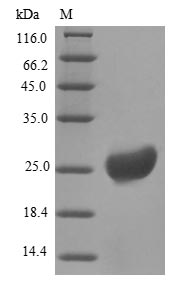Recombinant Bovine Resistin (RETN) gets produced in E.coli and includes the complete mature protein sequence from amino acids 19 to 109. The protein carries an N-terminal 6xHis-SUMO tag, which helps with purification and detection processes. SDS-PAGE analysis shows the product purity exceeds 85%. This preparation is meant strictly for research purposes and appears to offer a dependable option for experimental work.
Resistin is a cysteine-rich protein that cells secrete, and it seems to be involved in several biological processes like inflammation and how the body handles metabolism. The protein likely plays a significant role in creating insulin resistance and has drawn considerable attention in studies of metabolic and inflammatory pathways. Because resistin participates in these systems, it has become an important target for research into metabolic disorders and how immune responses work.
Potential Applications
Note: The applications listed below are based on what we know about this protein's biological functions, published research, and experience from experts in the field. However, we haven't fully tested all of these applications ourselves yet. We'd recommend running some preliminary tests first to make sure they work for your specific research goals.
Bovine Resistin is a hormone involved in insulin resistance and inflammation that requires precise folding, proper disulfide bond formation (with conserved disulfide bonds), and specific tertiary structure for its functional activity in receptor binding and signaling. The E. coli expression system cannot provide the eukaryotic folding environment or oxidative conditions for correct disulfide bond formation. The N-terminal 6xHis-SUMO tag (∼15 kDa) is large relative to the small mature protein (∼10 kDa), which may sterically interfere with the protein's functional domains and receptor-binding interfaces. While the protein may be soluble, the probability of correct folding with functional activity is low without experimental validation.
1. Antibody Development and Validation Studies
This application is highly suitable as antibody development relies on antigenic sequence recognition rather than functional protein folding. The full-length mature protein provides comprehensive epitope coverage for generating antibodies against bovine resistin. The high purity (>85%) ensures minimal contamination-related issues during immunization protocols.
2. Protein-Protein Interaction Studies
This application carries a significant risk without proper folding validation. Resistin interactions with receptors (e.g., TLR4) require precise tertiary structure and proper disulfide bonding. If correctly folded and active (verified through receptor binding assays), the protein may identify physiological interaction partners. If misfolded/unverified, there is a high risk of non-specific binding or failure to replicate genuine interactions.
3. Comparative Species Analysis
Meaningful comparative studies require native protein conformation and functional activity. If correctly folded and active (verified), the protein enables valid evolutionary comparisons of resistin function across species. If misfolded/inactive (unverified), comparative analyses would yield misleading insights about species-specific differences.
4. Biochemical Characterization and Structural Studies
These studies are essential for determining folding status. Techniques should include circular dichroism spectroscopy to assess secondary structure, size-exclusion chromatography to evaluate oligomeric state, and disulfide bond analysis. However, the large SUMO tag may dominate the protein's biophysical properties and interfere with high-resolution structural studies.
5. In Vitro Assay Development
This application is well-suited for developing detection assays. The protein serves as an excellent standard for quantitative resistin detection, as immunoassays depend on epitope recognition rather than functional conformation. The high purity and defined concentration ensure reliable assay calibration.
Final Recommendation & Action Plan
The E. coli-expressed bovine resistin with a large SUMO tag may not be properly folded for functional applications due to the lack of eukaryotic disulfide bond formation machinery. Begin with Application 4 (Biochemical Characterization) to assess folding quality through CD spectroscopy, SEC, and validate functional activity using receptor binding assays before considering functional applications. Applications 1 and 5 (antibody development and assay development) can proceed immediately. Applications 2 and 3 require rigorous functional validation. If bioactivity is low, consider using mammalian-expressed resistin for critical functional studies to ensure native conformation and activity.






